Certain vital events from the American Revolution have become so iconic that they still loom over our collective consciousness. The Boston Tea Party, Paul Revere's famous ride, and George Washington's crossing of the Delaware River aren't just important historical events--they are symbols of perseverance, self-sacrifice, and the quest for independence. Assassin's Creed III depicts some of these milestones, though it doesn't fully romanticize early American culture. These were somber times, sullied by bloodshed, slavery, and oppression, and this ambitious action adventure isn't afraid to confront the darker aspects of colonial expansion.
Assassin's Creed III also isn't afraid to draw parallels between historical events and modern ones, making statements about subjects like the fairness of the press that ring just as true today as they did then. You explore these themes from the perspective of two characters: Desmond Miles, a modern-day Assassin seeking to halt the ambitions of the opposing Templars; and Ratonhnhaké:ton, Desmond's Native American ancestor, more commonly referred to as Connor.
In some respects, Connor is a vessel for ideas more than a force of nature in his own right. Noah Watts' unsure voice acting keeps Connor at arm's length, emotionally--though in some respects, the distance is appropriate, given Connor's uncertain path through a complex political landscape. Connor finds himself a key figure within the Revolution; he fires cannons, commands troops, and jams his tomahawk into loyalist flesh. He conspires with Samuel Adams, and participates in renowned occasions such as the Battle for Bunker Hill. Assassin's Creed III renders particular details with great historical and visual authenticity. Major and minor figures are depicted; the cities of Boston and New York are exquisitely re-created; and even minutiae like the lines of The Beggar's Opera are presented with fine accuracy.
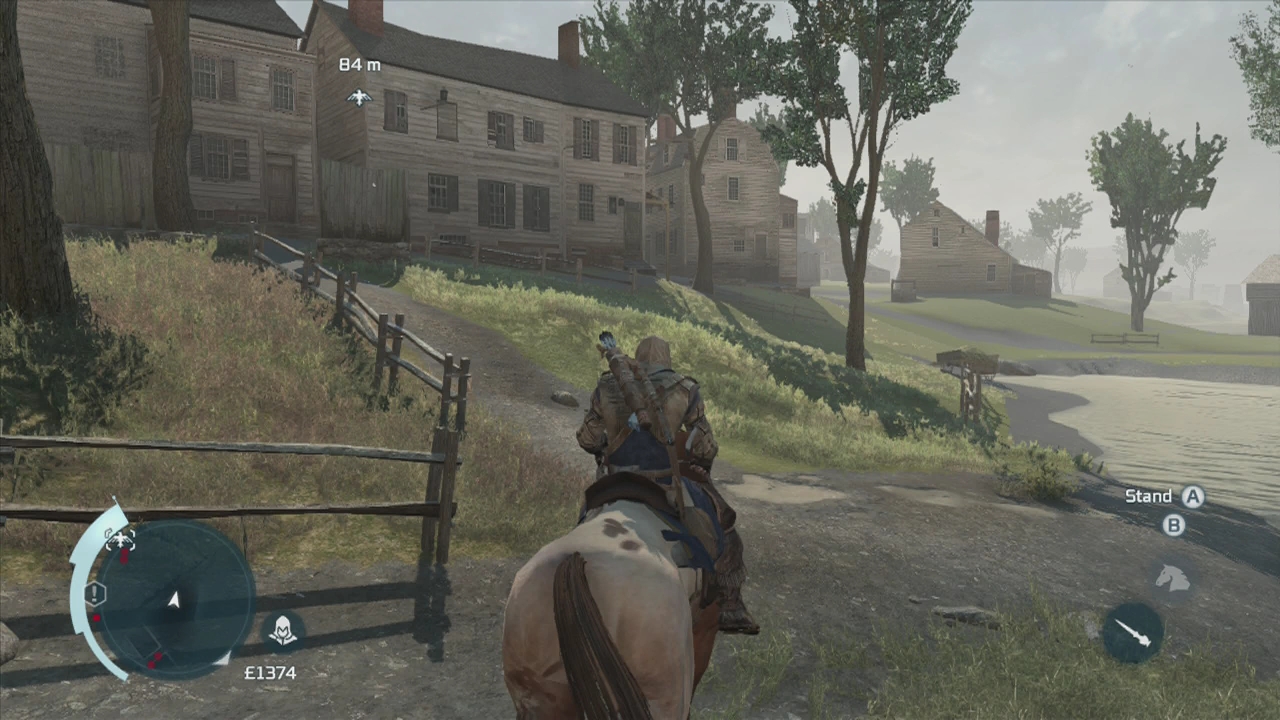
Assassin's Creed III is hardly a documentary of America past; it's historical fiction, semi-twisted by the conspiracy theories that inhabit the overarching narrative that drives this ongoing series. If you're a newcomer, you'll be glad for the opening montage that fills you in on the ongoing Templar-versus-Assassin conflict. You learn that Desmond is now creating his own legend, and holds the fate of the world in his hands. Assassin's Creed III draws important parallels between the two men, both of whom navigate a thorny relationship with an estranged father. Desmond's story tugs at the heart more than once, not because of his newfound relationship with his aloof father, but because he learns more of the civilization that preceded us here on earth--and its futile attempts to ward off the disaster that annihilated it.
In both time periods, themes that the series has previously explored are further deepened. The Templar point of view is frequently expressed, often via the soliloquies of dying men who plead the good intentions of a philosophy that would seem to pave an apparent road to hell. Yet the truth isn't so cut-and-dried, and Connor is forced to confront his own convictions. You hear the sincere and convincing words of the men you've assumed represent the wrong side of morality, and must wonder: are the ideas of good and bad so absolute after all? Are the men you cradle in your arms as they gasp their dying breaths necessary casualties, or do they whisper ideas worth hearing and understanding? As one character insists, "There is no one path through life that's right or fair."
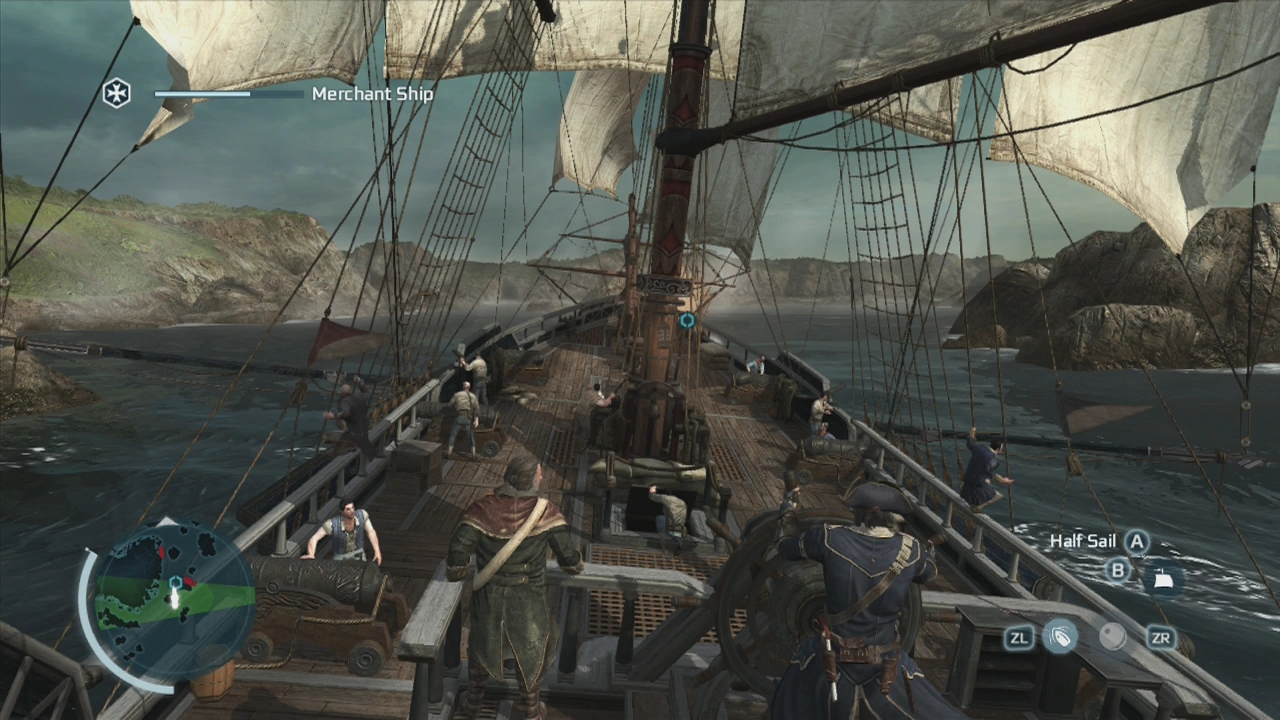
When playing Desmond, you sneak, run, and leap your way through relatively linear levels, climbing up skyscrapers and sneaking through suspicious crowds when you aren't giving concussions to Templar agents. These fluid sequences hint at the possibility of full-fledged modern-day adventuring--though never quite arriving there. There does come an important revelation, however: the typically surprising finale that leaves you scratching your head, and in this case, forces you to consider an unpleasant truth about the nature of humanity. The finale lacks punch and closure, but leaves you guessing, trying to weave a tapestry of truth out of the conspiracies that have always buoyed the series' self-serious stories.
You spend most of your time as Connor, however, though this fact may not be abundantly clear when you first leap into the past. Within the first several hours of the game, you do get chances to experience the fanciful parkour mechanics for which the series is known, but Assassin's Creed III's early times are focused on establishing tone and backstory--not on free-form exploration. As you play that opening, it's hard not to wonder: when does the fun stuff come? In retrospect, however, the slow pace makes sense, giving you a chance to become invested in the world and its people, and allowing later story events to wield power they may not otherwise have held.
Once the stops are pulled out, Assassin's Creed III allows joyous roaming within its bustling cities. The New York and Boston of this open-world game are expansive and detailed, and you climb towers, jump from roof to roof, and scale walls in fluid motion. The very act of movement in this series is a delight, and Assassin's Creed III expands on the series' parkour mechanics by sending you into the wild frontier and allowing you to climb trees and leap among the branches. It takes some time to get accustomed to the rhythms of tree-jumping, which can be finicky and unpredictable. Though you can more or less speed across Boston and New York as if the buildings were your own personal jungle gyms, when seeking to fly through the frontier, you must keep your eyes peeled for the telltale signs of a climbing opportunity. You use a fallen tree much as a plane uses an airport runway, gaining momentum and then soaring.
There are moments that slow you down; you might not be positioned quite right and thus swing impotently rather than flow smoothly toward the next branch. You might even make an inadvertent leap of faith into a leaf pile below that you didn't notice until the game decided you were trying to fall into it. You spend more time galloping across the frontier on horseback than you do within the trees, however, and you can quick travel to key locations as well, including your homestead. The homestead isn't fully your own--it belongs to Achilles Davenport, a former assassin who one day finds a persistent Ratonhnhaké:ton knocking at his door. Achilles is one of Assassin's Creed III's best characters, and it's a pity he doesn't get more screen time; his tough love balances Connor's naivete, but the bulk of Connor's training time is left only to your imagination.
The homestead is more than just a place for Connor and Achilles to banter and argue--it's the central element of Assassin's Creed III's economy. Like much of Assassin's Creed III, the homestead-focused facets are purely optional, yet they are worth exploring. The homestead is about building: building a village, building a future, and building relationships. By performing related missions, you befriend craftspeople, gatherers, hunters, and more, all of whom might find a place on the homestead. In turn, they can craft items that you sell via caravan for profit. (You discover recipes in treasure boxes throughout the world, some of which must be opened by performing a lock-picking minigame.) The homestead missions are varied, having you protect a miner as he scavenges for ore, search Boston for a drunken doctor, or break up a fisticuffs. In turn, your income grows, you meet new and interesting characters, and the homestead becomes, well, a home.
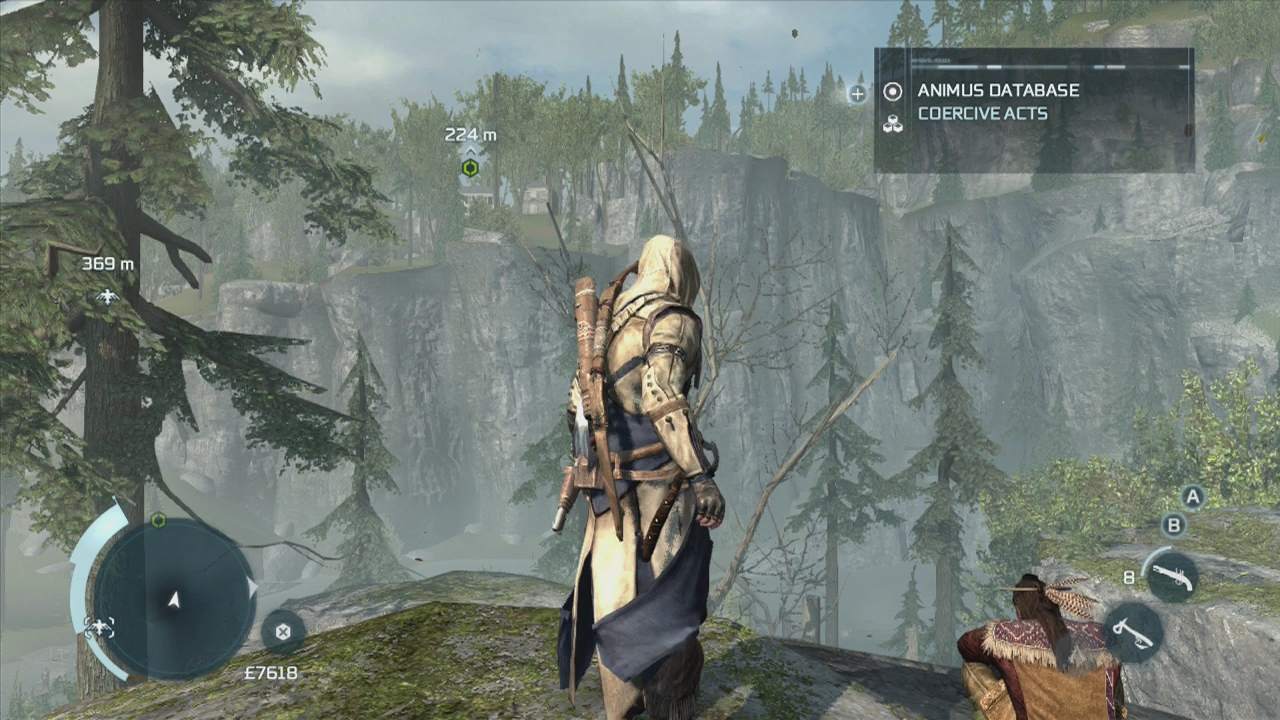
Meanwhile, out on the frontier, you can supplement your storehouse by trapping or attacking wild animals and then skinning them, leaving their carcasses behind. There's rarely a pressing reason to go hunting, just as there has never been a pressing reason to use smoke bombs to facilitate an easy escape when you can just dispatch your foes with a sword or an axe. But there's something enjoyably bizarre about perching on a tree branch and then assassinating a bunny rabbit from above. You can examine various clues--the signs of a foraging deer, for instance--to identify the location of a nearby animal. Hunting isn't a necessary aspect of Assassin's Creed III, though, but more of a toy for tinkering with, unless you grow deeply invested in the homestead's economy.
You stumble upon guarded redcoat convoys to attack and loot out on the frontier, but cities are home to most of the action. Even outside of story missions, there's plenty to do in Boston and New York. Ben Franklin's missing almanack pages float in the sky, giving you a reason to take to the rooftops and prance about. (You're rewarded with excerpts from the famous Poor Richard's Almanack, which are full of clever wordplay.) Liberation missions have you rescuing townsfolk from British soldiers, burning diseased blankets, and protecting farmers from rampaging redcoats. In almost every location, frontiersmen tell tall tales of flying saucers and the sasquatch, and the truths you discover if you follow these leads make for an interesting thematic twist.
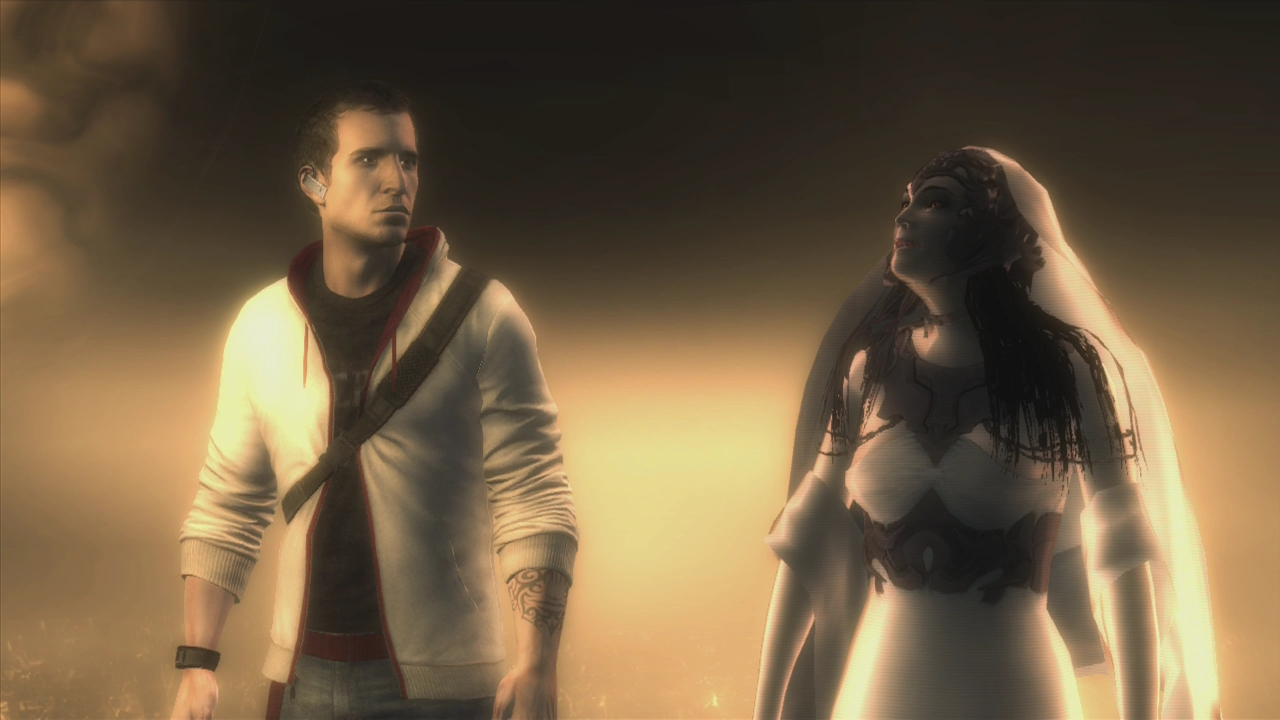
Your exploits have you making direct contact with guards and soldiers, and combat resembles that of Batman: Arkham City even more than past Assassin's Creed games. You counter by pressing the proper button when an indicator appears over an enemy's head, and you no longer have to manage a lock-on mechanic. Battles are fluid and bloody, as Connor chops, slashes, and somersaults about, though as always, you couldn't accuse combat of being especially difficult. Musketeers take aim, but if there's a nearby enemy, you can grab him and use him as a human shield, which protects you and dispatches a guard in a single move. Notably, Assassin's Creed III abandons health items and embraces regenerating health, though the game isn't particularly easier or harder than its predecessors.
There are chances to go stealthy too; Connor crouches automatically in tall grass, and can even press against corners and peek around. Hiding in grass is handy a number of times, though peeking around corners is an inconsistent proposition, since not every object has a "peekable" edge. In fact, inconsistencies occur within the parkour elements too, particularly out on the frontier, where you can scale rocky cliffs. Some cliffsides you can climb, and some you can't, even when it seems you should be able to grab hold and begin your ascent. And several chase sequences seem designed to annoy, such as one near the end of the game in which keeping up with your quarry is only frustrating and never fun.
The inconsistencies run deeper than these little inconveniences. Assassin's Creed III on the Wii U is remarkably buggy, more so than on other consoles, with glitches running the gamut from minor messiness to mission-breaking roadblocks. The game might hard crash, requiring you to unplug your system and plug it back in--and then crash again when you try to load the same save game. You might hear the action begin while you stare at a loading screen, and then be dropped into the game when you are already dead. Connor can get stuck standing in place, fully immovable, requiring you to restart the mission. A half-dozen soldiers may pop into view during a cutscene, clipping through speaking characters and totally ruining the moment. Three town criers might appear next to each other, half-clipped through each other's body and calling out the same dialogue.
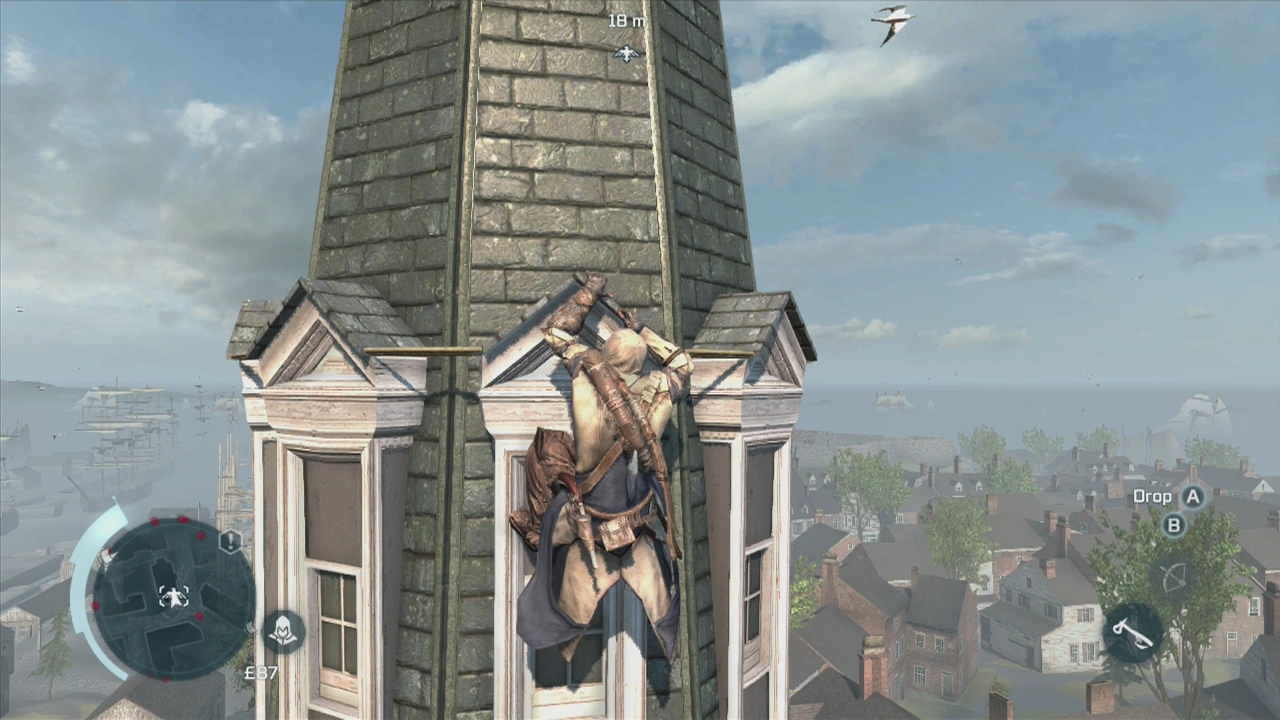
These technical foibles give the Wii U version of Assassin's Creed III an air of sloppiness, though this release falls behind in other ways, too. The draw distance isn't as impressive, so characters and objects spring into existence before your eyes. Granted, that occurs in other versions too, but it's much more distracting here. The frame rate, too, is inconsistent, sometimes chugging when combat gets hot and heavy.
Nonetheless, Assassin's Creed III is an attractive game; the expanses are vast, and the atmosphere is palpable. The game has a muted look, in keeping with the muddy trails of the wilderness and the rustic homes that sometimes line them. In New York, you see the remnants of the great fire of 1776, the ravages of which contrast greatly with the sunny opulence of Assassin's Creed II's Venice, and the Constantinople of Assassin's Creed: Revelations. It's hard not to admire the fantastic animations as Connor scales walls and trees, his hands authentically grabbing crevasses and his feet resting on outcroppings.
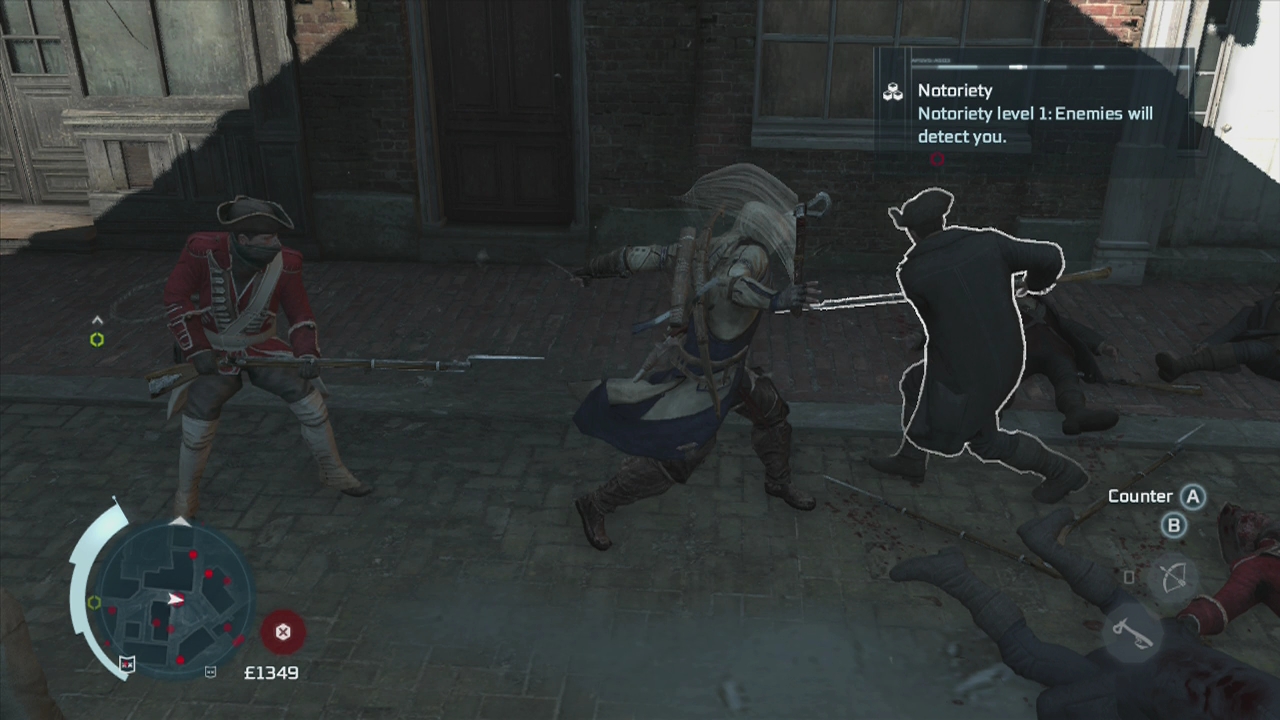
The presentation shines when Connor goes to sea, as well. Connor is not just an assassin but a captain too, and a series of (usually) short side missions have you getting behind the helm and facing the tumult of the open ocean. The visual details are marvelous, capturing the controlled chaos of an eager crew hard at work, and impressing upon you the madness of the roiling waves, which you can never hope to tame. Sailing is evenly paced but often super tense as you maneuver into just the right spot to unleash cannons on the ships that endanger you, while avoiding the cannonballs that whoosh your way. You occasionally finalize sea battles by ramming enemy ships and boarding them, finishing off the crew in a bloody melee showdown. You can purchase ship upgrades, some of which are very expensive and might have you heading back to the homestead to finagle ways of enhancing your income.
The multiplayer first introduced in Assassin's Creed: Brotherhood makes a return, and with it, the rising tension and brutal release of assassinating other players while simultaneously avoiding the watchful eyes of your opponents. There are a number of modes in which to exercise your skill, but in most cases, the goal is to blend into the crowds, preferably with groups including carbon copies of your own character model. And as before, you level up and earn skills to perform in battle, like throwing poison darts, as well as various passive perks. Unlike before, however, you can spend real money on various upgrades as well as in-game currency. There are loads of customization options in front of you, and it's tempting to drop the cash, whether it be to change various characters' looks or to feel like a greater asset to your team. That temptation, however, is diminished by the game's small online community.
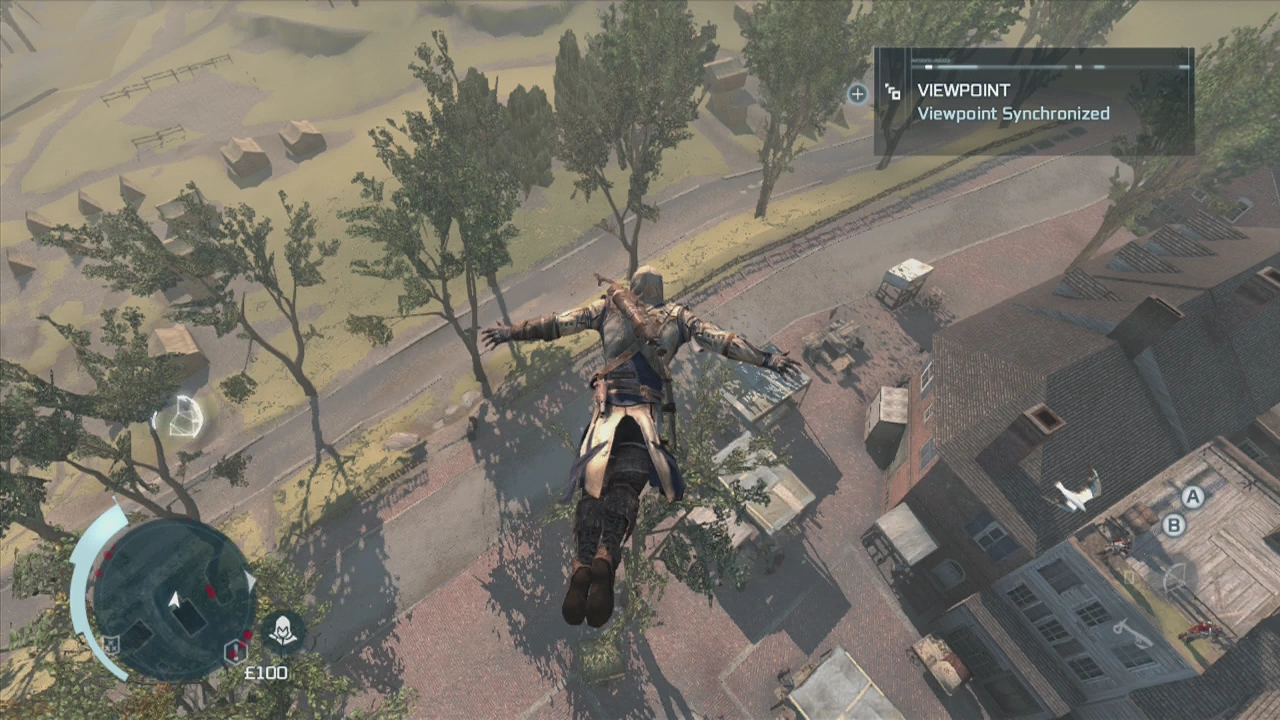
Should you find good matches, there's great satisfaction in pulling off a silent kill--and great heartache in axing a civilian to death because you mistake her for an opponent. If you feel more cooperative than competitive, you can try Assassin's Creed III's Wolfpack mode, which takes the competitive mechanics but pits up to four players against the AI and pushes you to rack up points as quickly as you can to add seconds to the countdown timer and progress from one sequence to the next. It's an action-focused mode in a franchise whose multiplayer modes usually rely more on building suspense, though the pressure of the countdown timer gives the mode a welcome sense of urgency.
It's a shame that the Wii U version of Assassin's Creed III is so prone to bugs and performance hitches; fortunately, the joys of exploration still shine through, allowing you to get lost in the bustle of cityfolk going about their lives. Connor's story is one of unlikely alliances and broken traditions; Desmond's is one of urgent decisions and past regrets. And their parallel narratives bridge the past and the present, even as both men look into an uncertain future.